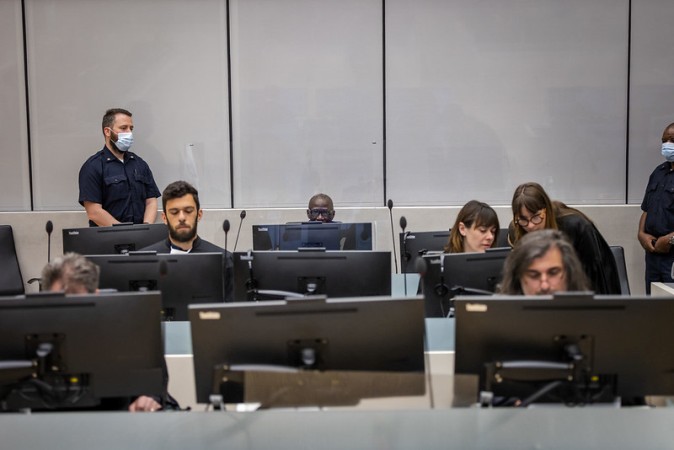Implications of the beginning of Darfur’s first war crimes trial
By Olivia Bueno
April 6, 2022 (NEW YORK) – The International Criminal Court (ICC) on 5 April began its first trial for war crimes and crimes against humanity in Darfur. Ali Muhammed Ali Abd-Al-Rahman, also known as Ali Kushyab faces 31 counts of war crimes and crimes against humanity.
The trial has been welcomed by Sudanese activists who have been calling for accountability for years. “Survivors and victims are happy that the process has started,” said Salih Mahmood Osman, a lawyer with the Darfur Bar Association. The day “is a momentous day for victims and survivors in Darfur who never stopped fighting to see the day the cycle of impunity is broken,” said human rights lawyer Mossaad Mohamed Ali of the African Centre for Justice and Peace Studies. The trial “will encourage the families of the victims and the survivors. It shows that no matter what or after how long, after how many years justice can be achieved,” says Montasir Nasir Waren of the Nubsud Human Rights Monitors Organization. Radio Dabanga reported that victims have gathered for a vigil to mark the occasion in areas that suffered the crimes that are the subject of the trial.
Activists are interested in monitoring the trial, especially with regard to the possibility that evidence in the trial may implicate others. “He is not a big fish, but he has a lot of information,” says Sudanese lawyer Ali Agab. There is speculation that information might come out at trial about the roles of Al Bashir or Hemetti, a key figure in the recent coup. Such information could influence public opinion in Sudan, depending on its nature.
Although the developments are welcome, they come at the end of a long wait. It has taken just over seventeen years for the case to advance from the referral of the situation in Darfur to the ICC by the UN Security Council. “This is an achievement for the human rights and international justice and anti-genocide movements – but it is a bitter one for several reasons,” says Suliman Baldo Founder of Sudan Transparency and Policy Tracker. “The top commanders of the Darfur massacres are unlikely to be surrendered by the coup leaders who helped implement their genocidal policies on the ground in 2003-04. Victims are still displaced and dispossessed of their lands and dignity – more than two million of them.”
The first trial thus is prompting calls for additional accountability. Darfuris “are upset that the process is not sufficient up to this moment,” says Mr Osman. Some hoped that either in addition to, or in place of, the international charges, that action might be taken at the national level. In particular, for example, many non-Darfuri Sudanese expressed concerns that the ICC would be unable to bring charges related to crimes committed before the ICC’s jurisdiction begins, in particular charges related to the 1989 coup that brought Bashir to power. Although charges have been brought against Al Bashir for this, the case has been adjourned several times and it is unclear how it is progressing. In any case, there is no evidence that any of the suspects has been charged with the same crimes for which they are charged at the ICC, which means that any domestic prosecutions would not undermine ICC jurisdiction.
The lack of cooperation from the government of Sudan remains a key obstacle to additional ICC action. It was unsurprising that the Al Bashir government did not support cooperation, but there was hope that the transitional government would push forward cooperation. Hopes were raised when the government of Sudan signed a memorandum of understanding with the ICC to cooperate on the Kushyab case in February 2021, and another dealing with all cases presently before the court in August 2021. In August, Minister of Foreign Affairs Miriam Al-Mahadi also announced that the country would hand over suspects to the ICC.
Sudan reportedly has three of the four outstanding suspects wanted by the ICC, former President Omar Al Bashir, Ahmad Muhammad Harun and Abdel Raheem Muhammad Hussein, in custody. It was particularly hoped that Harun would be handed over so that he could stand trial with Kushyab as they had been charged jointly. However, this has not yet been done. The military leaders who took power after the coup have assured the office of the prosecutor that the MoU is still in force, but activists are sceptical. Cooperation “has become much more difficult now,” says Ali. Some say that the Darfuri rebels who participated in the coup have agreed not to hand over suspects, despite the fact that they previously advocated for accountability. “All the people now in power, they’re not interested in talking about justice,” says Agab. Indeed, there are rumours that Bashir was released in the aftermath of the 25 October coup.
In addition, there is recognition that serious crimes are continuing in Darfur, in part because impunity has continued. Indeed, violence has reportedly killed more than 30 and injured 56 in the last week according to Radio Dabanga. “Atrocity crimes continue to be committed in Darfur by government forces and militias they formed and armed,” says Baldo. “They are committing the same crimes, but there is no action,” says Ali. A single trial is not likely to have a large impact on the, but it may begin, slowly, to erode the prevailing culture of impunity. “It may have an indirect impact,” says Waren, “it is sending a message like a warning to those people who are still active in committing crimes in Darfur and the Nuba Mountains.”

